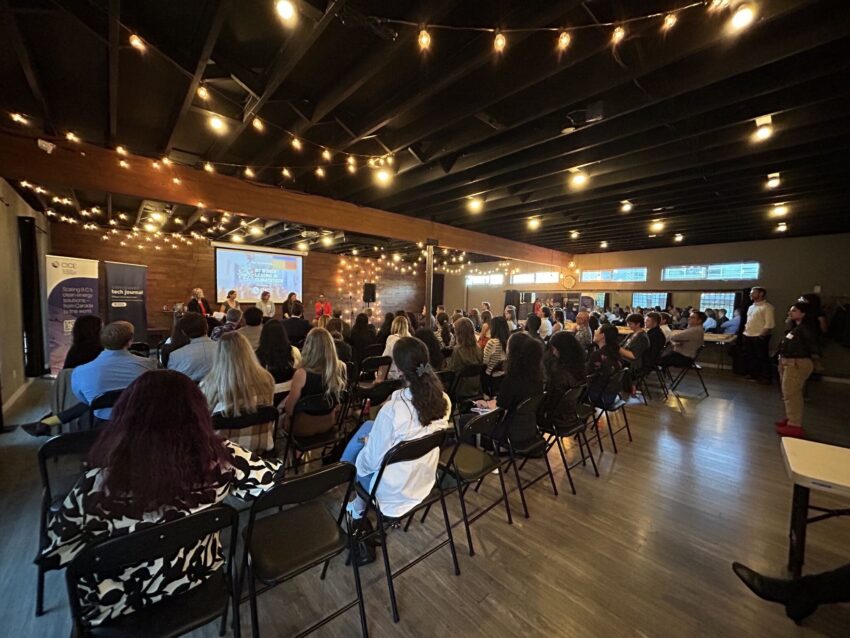
Having more women in decision-making roles improves sustainability, innovation, and profitability while reducing risk. This is especially true in climate tech: to achieve the transformational energy transition needed to build a net-zero future, we must leverage all the talents, perspectives, and experiences available.
That’s why insights from “#VTJTalks: BC Women Leading in Climate Tech” were so compelling. On September 18th, CICE and Vancouver Tech Journal hosted a #VTJTalks panel where women leaders in climate tech shared their journeys, triumphs, and challenges. The discussion highlighted common gender-based obstacles and underscored the pressing need for more women in leadership in an industry critical to our economy and planet.
Moderated by CICE’s CEO Sarah Goodman, the event featured trailblazing women who are using their expertise, creativity, and passion to shape the future of our planet including:
- Jennifer Anderson, Partner, Renewal Funds
- Kim Haakstad, VP Stakeholder Relations, Miraterra
- Bethany Ladd, Head of Operations & Co-Founder, Arca
- Sumreen Rattan, Co-founder and COO, Moment Energy
Key themes highlighted the importance of confidence, community, and challenging assumptions to remove systemic barriers and improve representation. And for good reason:
- Only about 10% of cleantech companies in Canada have female founders
- About 15% of venture partners are women
- Less than 3% of the money from VCs globally goes to women-led enterprises

The Power of Representation
Having more women in decision-making roles is proven to improve sustainability, innovation, and profitability while reducing risk. This is especially true in climate tech, where diverse perspectives are essential for achieving the transformational energy transition needed for a net-zero future.
Confidence and Community
The panel noted that it’s common for women to be underestimated – by others and themselves – especially early in their careers. With experience, they develop the confidence to challenge assumptions and showcase their depth of expertise.
“Confidence is key, and people can feel it. Over the past four years as a founder, I’ve noticed the difference between my early pitches and meetings and how I show up now. I love seeing people’s reactions when they initially underestimate me, then realize the depth of my knowledge,” said Sumreen Rattan.
She added, “Even if others underestimate me, I cannot underestimate myself. I have to enter the room with confidence and avoid getting caught up in my own head.”
Bethany Ladd also pointed out that being a woman founder carries additional pressures. “Sometimes, it feels like you’re doing multiple jobs: the main job you’re working hard at, and the additional jobs of building up your confidence, being a role model, and advocating for your fellow women. It’s like taking on an extra responsibility while already handling something incredibly challenging. I’m still on my own journey with this, figuring it out as I go. But it’s important to remind yourself not to take on too much. Balance is key, and we can all relate to the importance of it.”
The panel underscored that building confidence and a strong network, and knowing your worth, are key tools for success.
Funding and Representation Gaps
The panel also highlighted the significant funding and representation gaps in climate tech. About 2.4% of the money from VCs globally goes to women-led enterprises, and only 15% of venture partners are women. This gap is exacerbated by biases in investment pitches and more conservative approaches compared to men.
Jennifer Anderson emphasized, “Know your worth. When entering negotiations or pitching your company, understand what your competitors are valued at and know what others are being paid”.
The panelists emphasized the need for more support and mentorship for women founders to bridge this gap.
Innovative Solutions and Impact
CICE is proud to invest in some of B.C.’s most innovative companies advancing climate solutions. However, with women making up 50% of the population but leading just 33% of CICE’s portfolio companies, it’s clear there is work to do.

Sarah Goodman
CEO at CICEThe solutions created by women-led enterprises benefit from a wider range of perspectives. Underrepresented groups are often the ones who can identify missing voices, creating a more inclusive environment and better outcomes.
The Path Forward
The conversation touched on the need to actively build more inclusive work environments on the path to decarbonization.
Kim Haakstad shared, “There are systematic things you can implement as a company to foster inclusivity. Beyond policies, it’s about creating a welcoming environment and recognizing that underrepresented groups often bring with them a history of trauma”.
Companies like Miraterra are implementing systematic changes to foster inclusivity, such as offering reproductive health benefits, flexible workdays, and ensuring pay equity.
All panelists emphasized that creating a supportive work environment for everyone is crucial for helping women leaders and founders emerge and grow.
September 18th‘s BC Women in Climate Tech event was created as part of CICE’s mission to advance diversity and equity within the climate tech sector and support a just energy transition. CICE is committed to addressing the significant underrepresentation of women founders in the broader cleantech ecosystem. CICE’s objective is to foster a more inclusive environment that supports and elevates diverse voices in the innovation and development of climate solutions.
